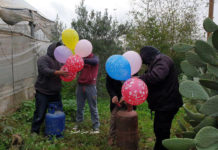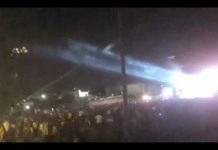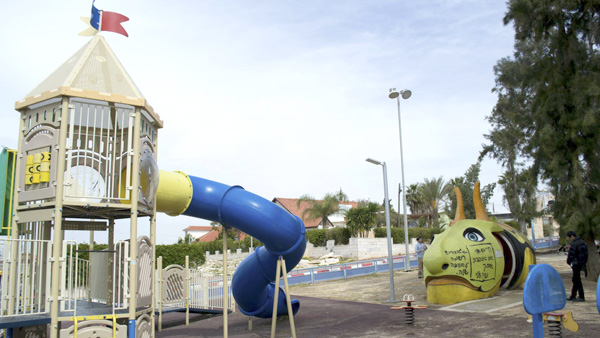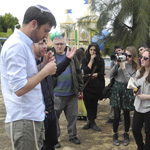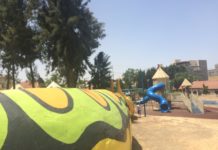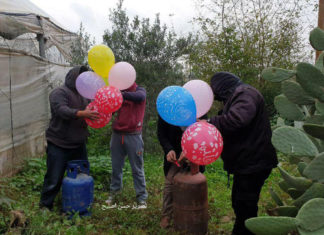No long showers? No loud music? Constant threat of rocket attack? Welcome to the town of Sderot, Israel.
A caterpillar bomb shelter in a Sderot playground. Photos credit: Max Fruchter
As one of eight children, I was shocked by the sight before my eyes. The bomb shelter looked like it held only about 25 people. Unfortunately, in most cases there are more than 25 civilians who need shelter here. Yet this isn’t what bothered me the most. The fact that there were at least five other bomb shelters within a 100-foot radius illustrated the severity of the situation.
Some may guess I was at an army base or in a war zone. But I guarantee no one would guess that I was at a playground. No one would guess that children would have to “play” in such conditions. In February, I was privileged to visit Israel as part of the Write On for Israel program sponsored by The Jewish Week. As part of our educational tour we visited Sderot, a city located near the Gaza
border, whose residents live under constant fear of rocket fire. Families in Sderot live at risk every single day and their stressful situation must end.
For the past 10 years, roughly 18,000 civilians in Sderot have been living in constant fear of rockets being fired from nearby Hamas in Gaza. This horror continues today and has made life unbearable for all of those living in Sderot. During the evening of April 8, Palestinians fired a rocket at Sderot and thank God there were no fatalities or injuries. However, something not tangible, yet invaluable did die: The hope that civilians in Sderot hold onto was extinguished by another rocket, a perpetuation of an ongoing, unresolvable conflict.
What are these rockets? What effect do they actually have? How many are actually fired? Roughly 10,000 Kassam rockets have been fired in the past decade. These short-range missiles developed by the Hamas terrorist organization can reach beyond 12 miles. That’s more than 12 times the distance between Sderot and Gaza, allowing for a clear and easy firing range.
Nearly 97 percent of these rockets are fired from civilian populated areas, making it very difficult for Israel to respond without causing large casualties and being depicted as the bad guy, according to an article posted on Sderotmedia.org. The website is dedicated to raising awareness about the situation in Sderot.
In addition, more than 700 Israelis have been injured and 25 have been killed in just eight years, as reported by Sderotmedia.com. Approximately 3,000 Israelis in Sderot are being treated for psychological trauma. Only four schools in Sderot offer protection from the missiles, causing thousands of civilians to switch to schools located outside of Sderot.
Given that life in Sderot is challenging, there must be support in order to alleviate the situation, right? Completely incorrect. Residents of Sderot are lacking vital social services. For example, there are only four psychologists available in Sderot, making it very difficult for the 3,000 trauma victims to receive treatment, according to Sderotmedia.com.
In addition, the red-alert alarms don’t function on a daily basis. Cold or rainy days hamper the system, leaving civilians with absolutely no warning of attack. When the alarm does work, it is limited to identifying Kassam rockets. Mortar shells, which are also fired from Gaza, cannot be detected. So essentially, civilians must be prepared to run for shelter at any given point in time, not just when the alarm sounds.
As shocking as it may sound, the State of Israel has not declared Sderot a war zone. Therefore, businesses and buildings that have been damaged do not receive compensation for damages, causing the economy in Sderot to suffer greatly.
During our visit we were fortunate to meet Noam Bedein, a temporary resident of Sderot and the CEO of Sderot Media Center for the Western Negev. He explained that for most of us, listening to music, taking a shower and going for a car ride are mundane activities. In Sderot, they are unattainable privileges. The 15 seconds one is given to run for his or her life plants everlasting fear in people’s minds. IPods and mp3 players are unheard of due to the anxiety caused by the thought of not hearing the alarm. Car rides are filled with fear and stress, considering the 15 seconds you have to unstrap your child from the car seat and run to safety. Showers are taken with haste, given the concern that the din of running water may overpower the alarm warning of an incoming rocket. These fears are not every now and then; they are not sometimes. This anxiety pervades each and every day. Every second of every day each person living in Sderot must consider the fact that at any second at any place, a rocket can be fired. (Photo: Write On for Israel students meet with Tomas Lee, on left, and Noam Bedein of the Sderot Media Center.)
Living in Sderot means living in fear and anxiety. Safety and security is constantly on everyone’s mind. Activities which appear to be dull and dreary to you and me are unachievable desires that people in Sderot yearn to participate in without all of the concerns that come with them. The question now becomes, what can you do to help? Every effort taken to raise awareness is helpful and has a large impact on reaching the ultimate goal of stopping rocket fire against Sderot and all of Israel.
Create a petition and gather signatures from your area in order to show how many people really do care about the rockets fired at Sderot. Bring in speakers to educate those who aren’t aware of what life in Sderot is like, or better yet, speak to others. Share this article, write your own. The possibilities are endless. In any case, do not fall victim to apathy and believe that you cannot make a difference.
Don’t stop reading this article and return to activities that you view as mundane but that residents in Sderot view as a privilege. So spread the word and make a difference in the lives of those whom you hopefully now are empathetic towards.



